When Your Cannabis Has Yellow Leaves: Nitrogen Deficiency
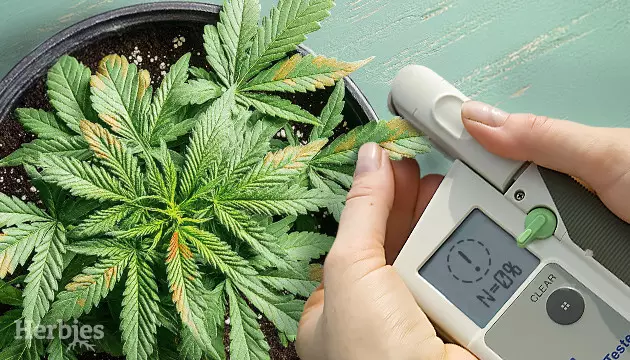
Growing cannabis is easy, but it does require a certain amount of effort by the grower. One of the biggest requirements when it comes to growing weed is to give your plants the nutrients necessary to keep them healthy and ensure a harvest you can be proud of. If you’ve ever noticed your marijuana leaves turning yellow, this is definitely a sign of nitrogen deficiency. Left untreated, nitrogen deficiency in cannabis can take a serious toll on the plant’s health and decrease yields come harvest time. If you’re serious about growing the best weed possible, knowing all you can about marijuana nitrogen deficiency is crucial.
Why Nitrogen Is So Important For Marijuana Plants
Nitrogen has been referred to as “the most important nutrient that plants acquire from the soil” and is, hands down, one of the most imperative if not THE most imperative plant nutrient your marijuana plants need. Why is nitrogen so critical when it comes to growing cannabis?
For one, nitrogen is essential for keeping cannabis leaves green. Nitrogen is a fundamental element in chlorophyll, the pigment found in plants that’s responsible for their varied hues of green leaves. This is why nitrogen deficiency in weed can easily be identified by the marijuana leaves turning yellow.
Nitrogen also plays a huge role in photosynthesis, as chlorophyll is a vital component of this integral process in which plants use sunlight to create the energy they need to survive.
Marijuana plants also need nitrogen because it’s a huge element of the amino acids found in plants. All plants create proteins from the amino acids that are found in nitrogen, with these proteins being essential for healthy growth and development.
Finally, nitrogen is so important for marijuana plants because it’s an imperative element of nucleic acids that are necessary for plants to grow and reproduce. Nucleic acids can be thought of as the genetic material of a plant’s cells, as they include DNA and the different types of RNA.
How To Identify Marijuana Nitrogen Deficiency
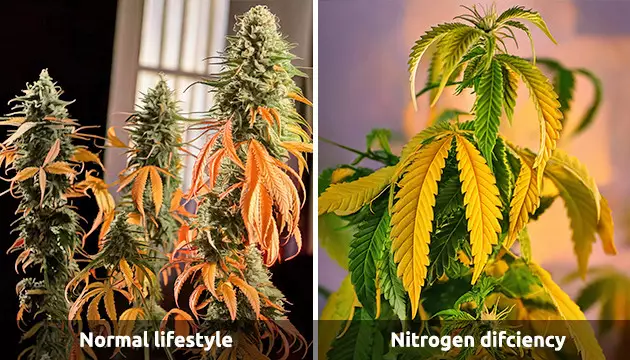
Knowing just how important nitrogen is to the health of your plants, it’s easy to see how a deficiency could do some serious harm and negatively affect your harvest.
What exactly are the signs of nitrogen deficiency in cannabis plants? What should you be looking out for to determine if you might have a marijuana nitrogen deficiency?
Let’s take a look.
The biggest indication of a nitrogen deficiency is marijuana leaves turning yellow. When in the stage of early nitrogen deficiency, weed will develop yellow leaf tips, which will soon move over the whole leaf. Sometimes, however, yellow leaves are simply part of the plant’s lifecycle. It’s important to be able to distinguish between what’s normal and when you actually have a problem.
Did you know that it’s typical for older leaves at the lower part of a cannabis plant to turn yellow and fall off as the plant begins to mature? This is due to the younger leaves at the top part of the cannabis plant “stealing” the nitrogen from the older, lower leaves. You’ll also notice marijuana leaves turning yellow and dropping off at the end of the plant’s growth cycle because nitrogen is being redirected to buds so they may beautifully bloom.
When do you know you have a problem with nitrogen deficiency? One of the biggest nitrogen deficiency symptoms is when the leaves on your cannabis plant begin to turn yellow and start dropping off during the vegetative stage. If you notice the yellowing begin to climb and work its way up the plant, you most likely have a marijuana nitrogen deficiency.
Remember that when you see leaves turning yellow during flowering, this is usually completely normal. Buds need nitrogen too! However, when they’re turning yellow during vegetation and falling off your plant fast, you’ve definitely got a problem. If this happens, knowing everything you can about correcting nitrogen deficiency is crucial.
How To Fix Nitrogen Deficiency In Cannabis
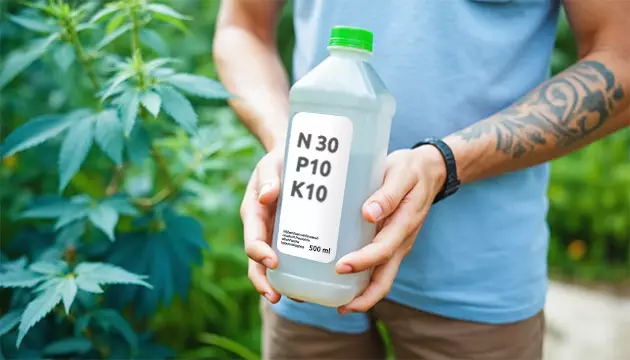
Soil nitrogen is found in three common forms: organic nitrogen compounds, nitrate (NO3) and ammonium (NH4).
If you’ve got a marijuana nitrogen deficiency problem, you’ll want to correct it as soon as you can. The good news is that doing so is as easy as giving your plants balanced nutrients. Almost all pre-mixed plant nutrients contain nitrogen, as it’s so essential to overall plant health.
When looking at plant fertilizer packaging, nitrogen will be the first number listed in the three-number set found on all premixed nutrients. These numbers represent N-P-K (nitrogen, phosphorous, potassium) content present in the fertilizer. If you want to fix a nitrogen deficiency in cannabis plants, look for a water-soluble fertilizer where the “N” number is much higher than the P or K. This will typically solve any nitrogen deficiency issues quickly.
Water-soluble plant nutrients will feed nitrogen straight to the plants roots where they need it most. Once they’re fertilized, plants will begin to absorb the nitrogen as soon as it’s available to them, with the yellow cannabis leaves slowly turning back to green as a result.
If you notice cannabis nitrogen deficiency symptoms and take care of the problem right away, plants should bounce back to their natural shade of healthy, vibrant green in about a week’s time. However, keep in mind that yellow weed leaves that have been significantly affected by nitrogen deficiency will not recover and should be removed from the plant.
How To Avoid Nitrogen Deficiency In The Future
Of course, the best way to work around a nitrogen deficiency problem is to avoid it altogether. Taking the following steps to avoid marijuana nitrogen deficiency will ensure your plants stay healthy through all stages of growth.
The benefits of using pH and EC meters can’t be stressed enough. Why? Your pH levels in your growing medium effect nutrient availability to the plant. An EC meter will measure the salts in your growing medium present in water, acids and fertilizer. Knowing what they are will help ensure your plants are receiving the level of nutrients they need from the fertilizer you provide them.
When growing cannabis, it’s important to understand how much nitrogen your plants need at various points of their lifecycle.
Vegetative Stage
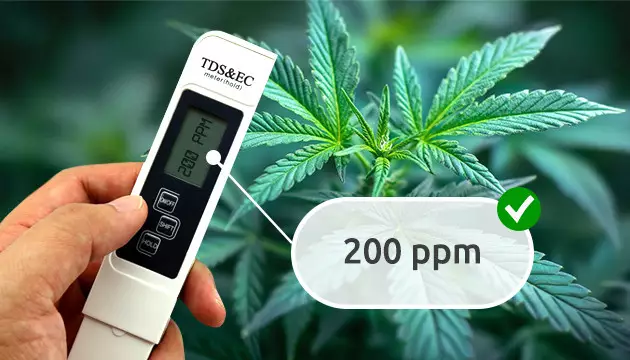
During veg, when plants experience the most growth, they will need higher levels of nitrogen. Ensuring you’re giving them a complete plant food during this time will typically result in healthy nitrogen levels. Normally, rapid vegetative growth requires around 200 ppm of nitrogen each feeding.
Most plant foods you can purchase at your local garden store contain optimal levels of nitrogen so that plants can flourish. When you give your plants the nutrients they need from the get-go, marijuana nitrogen deficiency can be avoided. Just try not to overfeed your plants, as this can also cause nitrogen problems.
Flowering Stage
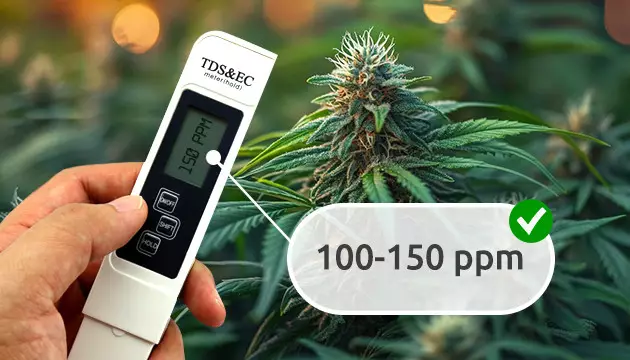
During the flowering stage when buds begin to ripen, lower levels of nitrogen are necessary to ensure a healthy harvest. Peak flowering will only require 100 to 150 ppm of nitrogen every feeding. When cannabis plants begin to make the transition from the vegetative stage to their flowering stage, it’s time to switch the type of food you’re giving them by offering them a fertilizer with lower nitrogen levels.
You’ll find that most “Bloom” or “Flowering” plant foods contain the correct ratio of nitrogen to other nutrients your plants need during this time. While they don’t need as much nitrogen during this period, they do need some. When looking for plant foods for this stage of growth, keep the N-P-K three-number set in mind and look for plant foods that contain a lower “N” number than P or K.
Cannabis plants take about a week to switch over to the flowering stage. The following is a good rule of thumb to keep in mind when making the switch from a “Veg” food to a “Bloom” or “Flower” food:
- Week one: Use one part veg fertilizer and one part bloom fertilizer.
- Week two: Use one part veg and two parts bloom.
- Week three: Use one part veg and three parts bloom.
- Week four and beyond: Use only bloom.
Nitrogen-Rich Additions To Your Plant’s Diet
If you’re looking to keep your plants free of nitrogen deficiency throughout its lifecycle, there are some nitrogen-rich elements you can add to your plant’s diet. Doing so will ensure you avoid nitrogen deficiency and keep your plants healthy all the way to harvest.
Some nitrogen-rich additions your pot plants are sure to love include:
- Fish Meal
- Fish Emulsion
- Urine
- Manure
- Alfalfa
- Feather Meal
- Cottonseed Meal
If you decide to give your plants additional sources of nitrogen, just make sure they’re not getting too much. You can tell if plants are receiving too much nitrogen if they turn a very lush, dark green. Too much nitrogen can also cause stalks to turn brittle and begin breaking.
Forgiving Strains to Avoid Nitrogen Deficiency Consequences
If your plants tend to suffer from cannabis nitrogen deficiency, it would be wise to stock up on hardy, resilient strains that will quickly spring back to health after you take action. Another great option is growing autoflowering strains that don’t require as many nutrients and suffer from nitrogen deficiency in weed less frequently in general. Here are some great options:
Lemon Pie Auto (FastBuds)
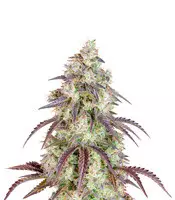
- Autoflowering
- Heaven high
- 450 - 550 g/m² indoors
50 - 170 g/plant outdoors
One of the most low-maintenance cannabis strains from FastBuds, Lemon Pie Auto is a no-brainer for growers who don’t want to deal with nitrogen deficiency in cannabis. Despite being undemanding, come harvest time, Lemon Pie Auto brings lots of flavorful, energetic bud with 24% THC.
Peyote Cookies (Barney’s Farm)
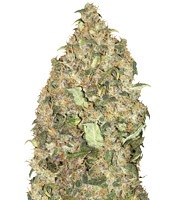

- Photoperiod
- Catching zen
- 550 - 600 g/m² indoors
600 g/plant outdoors
Forgiving to beginners’ mistakes, Peyote Cookies, when faced with nitrogen deficiency, won’t give up as fast and will spring back quickly after receiving a dose of nutrients. Nothing will prevent this reliable weed variety from yielding plenty of relaxing bud with amazing medical potential.
Gelato Auto (Herbies Seeds)
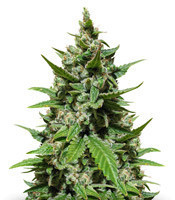

- Autoflowering
- Outpouring of creativity
- 400 - 500 g/m² indoors
800 g/plant outdoors
When planted in a rich soil mix, Gelato Auto is unlikely to suffer from any deficiencies, including nitrogen deficiency. With very little TLC, this autoflowering strain will produce outstanding results – sweet, creamy buds with 24-26% THC and energetic, creative effects.
Yellowing Weed Leaves? You Know What to Do
Nitrogen deficiency in cannabis is fairly common, but extremely easy to fix. If you begin to notice cannabis nitrogen deficiency symptoms in your plants, they’ll usually just need the right blend of nutrients to bring them back to good health.
Keep in mind that if you’ve grown your plants with nutrients from the beginning, they’re not likely to be deficient in nitrogen and won’t show the signs of any weed deficiency, including weed leaf discoloration. It’s also completely normal to see yellow cannabis leaves toward the end of the flowering period.
Keep your plants healthy and fed the proper nutrients and you’re not likely to run into a nitrogen deficiency in cannabis. If you do have a nitrogen deficiency, you’ll find that after taking the proper steps to correct this issue, plants should return back to a normal, healthy state in about one week.
Herbies Head Shop expressly refuses to support the use, production, or supply of illegal substances. For more details read our Legal Disclaimer.

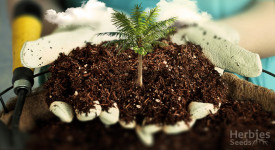

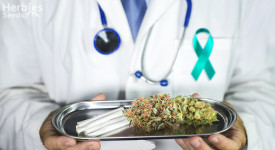
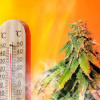

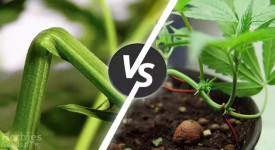
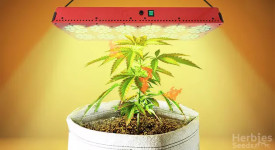
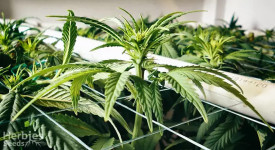
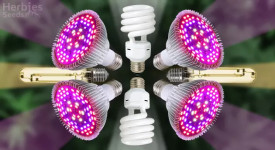
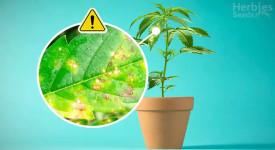
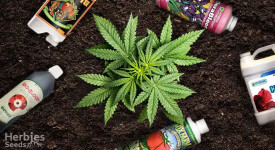
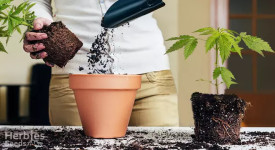
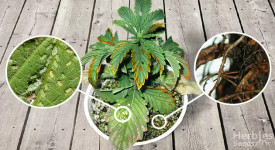
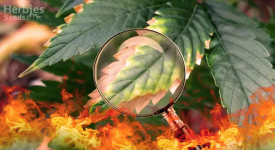
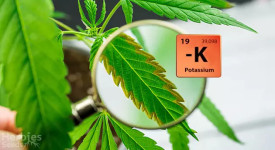

Thank you for leaving a comment for us!
Your feedback will be posted shortly after our moderator checks it.
Please note that we don’t publish reviews that: